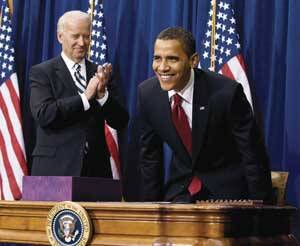Small towns, large cities, social service agencies and even the manufacturers of digital converters for television sets all expect to benefit from a piece of the $787 billion stimulus measure signed by President Barack Obama on Feb. 17. But amid all the mega-million-dollar transportation projects and infusions of federal cash for industries on the brink of insolvency, there are plenty of tax breaks and new funding for programs that directly aid poor people.
Some of the more dramatic elements of the American Recovery and Reinvestment Act, as the stimulus is formally known, include changes to the federal tax code that provide $288 billion worth of tax credits and deductions to aid the poorest Americans. For example, a single parent of two earning minimum wage will be eligible for up to a $1,750 child tax credit, nearly double the 2008 limit.
The law also expands the Earned Income Tax Credit for low-income families with three children or more and provides for about $116 billion in tax credits, $400 per worker in 2009 and 2010, in the form of reduced payroll deductions that will begin this summer. Even many of those who do not earn enough to pay federal income taxes will be eligible for a stimulus check under this provision. Also, families with incomes as low as $45,000 will be eligible to pay a lower, alternative minimum tax that was not previously available to them.
Some of the direct spending in the law includes a one-time payment of $250 to recipients of Social Security and Supplemental Security Income for the poor and to veterans who receive pensions and disability payments. The stimulus bill also extends unemployment benefits through the end of 2009 and raises the payments by $25 a week.
Lawmakers have also provided increased funding for basic necessities, including food and health care. Most four-person households that use food stamps will receive about $80 more per month starting in April under a program now known as the Supplemental Nutrition Assistance Program, or SNAP. The law also expands funding for the Women, Infants and Children nutrition program by $500 million and the Emergency Food Assistance Program by $150 million. Unemployed people who pay for their own health care insurance under the Cobra program will receive $24.7 billion to subsidize 65 percent of their premiums. Another $86.6 billion will go to states to help cover shortfalls in Medicaid coverage and $1 billion is designated for prevention and wellness programs.
The U.S. Conference of Catholic Bishops pushed hard for the child tax credits, the nutrition assistance programs, the support for Medicaid and the expansion of unemployment benefits. It also backed the provisions that will fund programs to prevent homelessness, to weatherize public housing and to stabilize neighborhoods by purchasing some foreclosed homes.
A provision that the U.S.C.C.B. worked successfully to keep out of the final bill would have required employers to use a much-criticized program to verify that all employees have legal permission to work in the United States.
Finally, the law also permits religious schools, colleges and universities to apply for funding to renovate institutions of higher education in order to make them more environmentally sustainable. Longstanding restrictions prohibit federal funds from being used for work on facilities used for sectarian instruction or religious worship, but other types of buildings at schools operated by religious organizations are eligible for funding.








